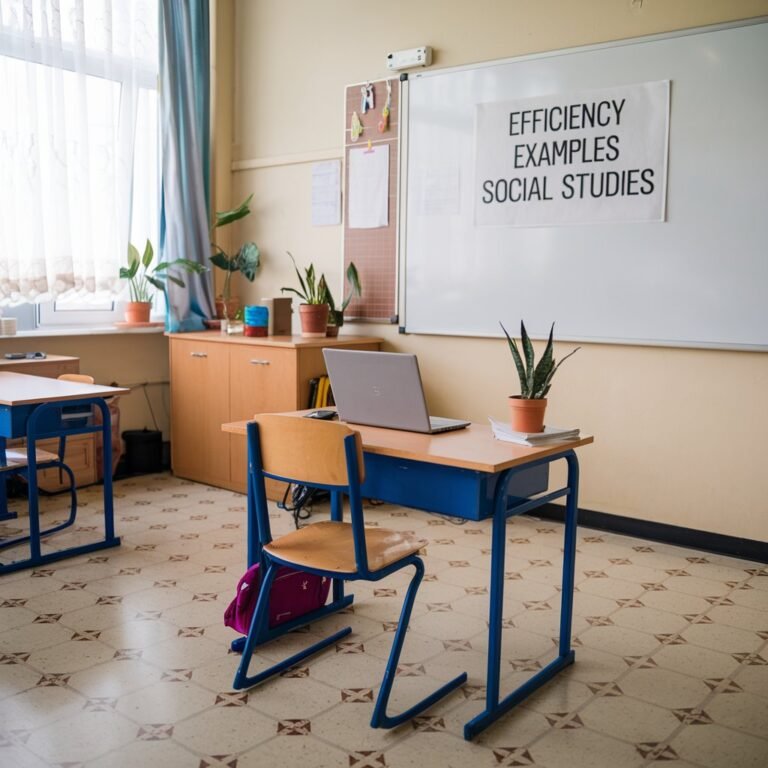Efficiency examples social studies help us understand how resources like time, money, and effort can be used in the best way possible. By looking at these examples, we can see how communities and societies make decisions to use what they have wisely. Learning about efficiency in social studies can also teach us about the benefits of making smart choices that help everyone.
In this blog, we will explore different efficiency examples in social studies that show how societies aim to balance their resources. Whether it’s a family making decisions about how to spend their money, or a government planning the best way to improve education, these examples can give us valuable lessons. We will discuss real-life cases where social efficiency leads to better outcomes for all involved.
What Are Efficiency Examples Social Studies? Understanding the Basics
Efficiency Examples Social Studies help us understand how societies use their resources in the best way possible. In simple terms, it’s about using what we have wisely to get the best results. Social studies look at how different communities and governments make these choices, from using time, money, to even natural resources.
When you study efficiency in social studies, you’ll see how smart decisions lead to better outcomes. For instance, a government might decide to build more schools because it will help children get a better education in the future. These kinds of decisions help everyone in the society, as they improve life for all people.
Understanding how to use resources wisely is a big part of social studies. It’s not just about saving money but also about making sure that everyone benefits. Whether it’s a family deciding how to spend their income or a country deciding how to protect the environment, efficiency examples show us the best way to make decisions.
How Social Efficiency Improves Everyday Life: Simple Examples

Social efficiency is about making sure everyone in a society benefits from the decisions made. In everyday life, efficiency examples in social studies show us how communities and governments plan and manage resources. For example, a local community might decide to build a park that everyone can use. By doing this, they are making sure the land is used in a way that benefits everyone, instead of using it for something that only helps a few people.
Examples of Social Efficiency in Real Life:
- Constructing more stops and green spaces for everybody to appreciate
- Using energy-saving devices to reduce power costs for all citizens
- Working on open transportation to lessen traffic and contamination
By making these smart choices, societies can improve life for everyone. Social efficiency is not just about doing something quickly but making decisions that help society grow and prosper in the long term. When governments and communities plan well, everyone benefits from those efforts.
Real-World Efficiency Examples Social Studies: From Families to Governments
Efficiency examples in social studies can be seen in both small and large scales. For example, a family might decide to buy food in bulk to save money. This helps them save time and money, allowing them to use their resources for other needs. Similarly, a government might decide to invest in renewable energy. This decision not only saves money in the long run but also helps protect the environment.
These real-world examples show how efficiency is used at different levels. Whether it’s in a family home or at a national level, smart choices about using resources lead to better outcomes for everyone involved. In social studies, understanding these decisions helps us see how we can make our own choices for a better future.
The Importance of Efficiency in Social Studies: Why It Matters for Society

Efficiency in social studies is important because it helps create a balanced society. When resources are used effectively, it means that more people can get what they need. This might be better schools, healthcare, or clean energy. The goal is to make sure that the decisions made today benefit everyone, both now and in the future.
Why Efficiency Matters in Society:
- It ensures better use of resources for all people
- It helps reduce waste and unnecessary costs
- It promotes fairness by benefiting everyone equally
By focusing on social efficiency, societies can improve the quality of life for their citizens. Understanding how these decisions affect everyone in the community is a key part of learning in social studies. This knowledge empowers people to make smarter decisions, whether it’s as individuals or as part of a larger group.
How to Use Efficiency Examples Social Studies to Make Better Decisions
When studying efficiency examples in social studies, it’s important to learn how to make better decisions. These examples teach us how small choices can add up to big changes. For example, a school might decide to use less paper to save money and reduce waste. This simple change can lead to a larger impact, saving money and being more eco-friendly.
Key Lessons from Efficiency Examples Social Studies:
- Continuously think about the drawn out effect of your choices
- Think about how everyone in your community will be affected
- Use resources wisely, whether it’s money, time, or energy
By learning from these examples, people can make better choices in their daily lives. These smart decisions not only improve life for individuals but also create a better world for everyone.
Conclusion
Understanding Efficiency Examples Social Studies helps us make better decisions. Whether it’s a family choosing how to spend their money or a government deciding how to use natural resources, social efficiency shows us how to use what we have in the best way possible. By making smarter choices, everyone can benefit and live better lives.
By learning about efficiency, we can also help our communities grow in a healthy way. It teaches us to think about the future and how our decisions today affect tomorrow. So, next time you make a choice, big or small, remember to consider how efficient it is for everyone around you!
FAQs
Q: What does social efficiency mean?
A: Social efficiency is about making smart decisions that help everyone in a society. It means using resources like time, money, and energy in the best way to benefit everyone.
Q: Why is social efficiency important?
A: Social efficiency is important because it helps communities and societies grow in a way that benefits everyone. It ensures that resources are used wisely for the good of all.
Q: Can you give an example of social efficiency?
A: Sure! A government building more public parks is an example of social efficiency. It helps the community enjoy green spaces, making the most of the land for everyone.
Q: How does social efficiency affect me?
A: Social efficiency can affect you by improving things like schools, healthcare, and the environment. It helps make life better for everyone in your community.
Q: How can I use efficiency in my daily life?
A: You can be more efficient by making smarter choices, like saving energy at home or buying in bulk to save money. Small actions can lead to big improvements!

